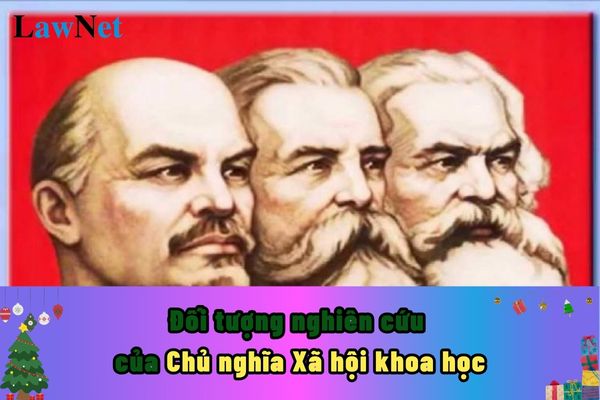What is the research subject of Scientific Socialism? How many chapters does Scientific Socialism at the higher education level in Vietnam include?
What is the research subject of Scientific Socialism?
Students can refer to the research subjects of Scientific Socialism below:
|
What is the research subject of Scientific Socialism? Scientific Socialism is a revolutionary doctrine tasked with researching the transition process from capitalist society to socialist society. Therefore, the research subjects of Scientific Socialism are extremely broad and diverse, focusing on the following fundamental issues: |
*Note: The information on the research subject of Scientific Socialism is for reference only.

What is the research subject of Scientific Socialism? How many chapters does Scientific Socialism at the higher education level in Vietnam include? (Image from the Internet)
What are the regulations on undergraduate training programs in Vietnam?
Under Article 2 of the Undergraduate Education Regulation issued along with Circular 08/2021/TT-BGDDT:
- Training programs shall be developed using the credit system and comprise subjects or units of study (hereinafter collectively referred to as “units of study”), which must include all mandatory units of study and meet training program standards according to existing regulations of the Ministry of Education and Training.
Training programs of dual-degree programs and major/minor degree programs must specify the total academic load and academic load of each degree.
- Content and expected learning outcomes of a training program shall apply to all modes of study, methods for training organization and types of students.
For those holding a qualification at a different level or in another major, the actual academic load shall be determined based on the recognition or transfer of accumulated credits and exemption from taking units of study already completed in the previous training program.
- Training programs must be announced to students before admission and at the start of the course; changes relevant to training programs shall be made in accordance with existing regulations and announced before adoption so as not to affect students negatively.
- Training programs shall have a standard learning plan for the whole program for each mode of study to provide orientations for students.
+ For full-time study, the study duration according to the standard learning plan for the whole training program must be appropriate to the duration provided for in the structural framework of the national education system and enable the majority of students to complete the training program;
+ For part-time study, the study duration according to the standard learning plan for the whole training program must be at least 20% longer than that of the full-time mode.
- Maximum time limit for students to complete a course shall be stipulated in the training institution regulation but shall not be longer than twice the study duration according to the standard learning plan for the whole course for each mode of study.
For students who take bridge programs and whose accumulated credits have been accounted for, maximum time limit for them to complete a course shall be determined by deducting the amount of study time corresponding to the completed academic load from the study duration according to the standard learning plan of the whole course.
Thus, according to the regulations, the training programs shall be developed using the credit system and comprise subjects or units of study (hereinafter collectively referred to as “units of study”), which must include all mandatory units of study and meet training program standards according to existing regulations of the Ministry of Education and Training.
How many chapters does Scientific Socialism at the higher education level in Vietnam include?
Additionally, under Section 1 of the Curriculum Outline for Scientific Socialism at the higher education level issued along with Decision 34/2003/QD-BGDDT:
- Scientific Socialism comprises 13 chapters covering the basic contents of Scientific Socialism,
- Scientific Socialism provides students with a scientific theoretical basis to understand the National Construction Program, the policies and guidelines for building socialism in Vietnam, to explain and have a correct attitude towards social practices, and to strengthen their firm belief in the path of advancing toward socialism, the path chosen by the Communist Party, President Ho Chi Minh, and our people.
Therefore, Scientific Socialism at the higher education level has 13 chapters.

